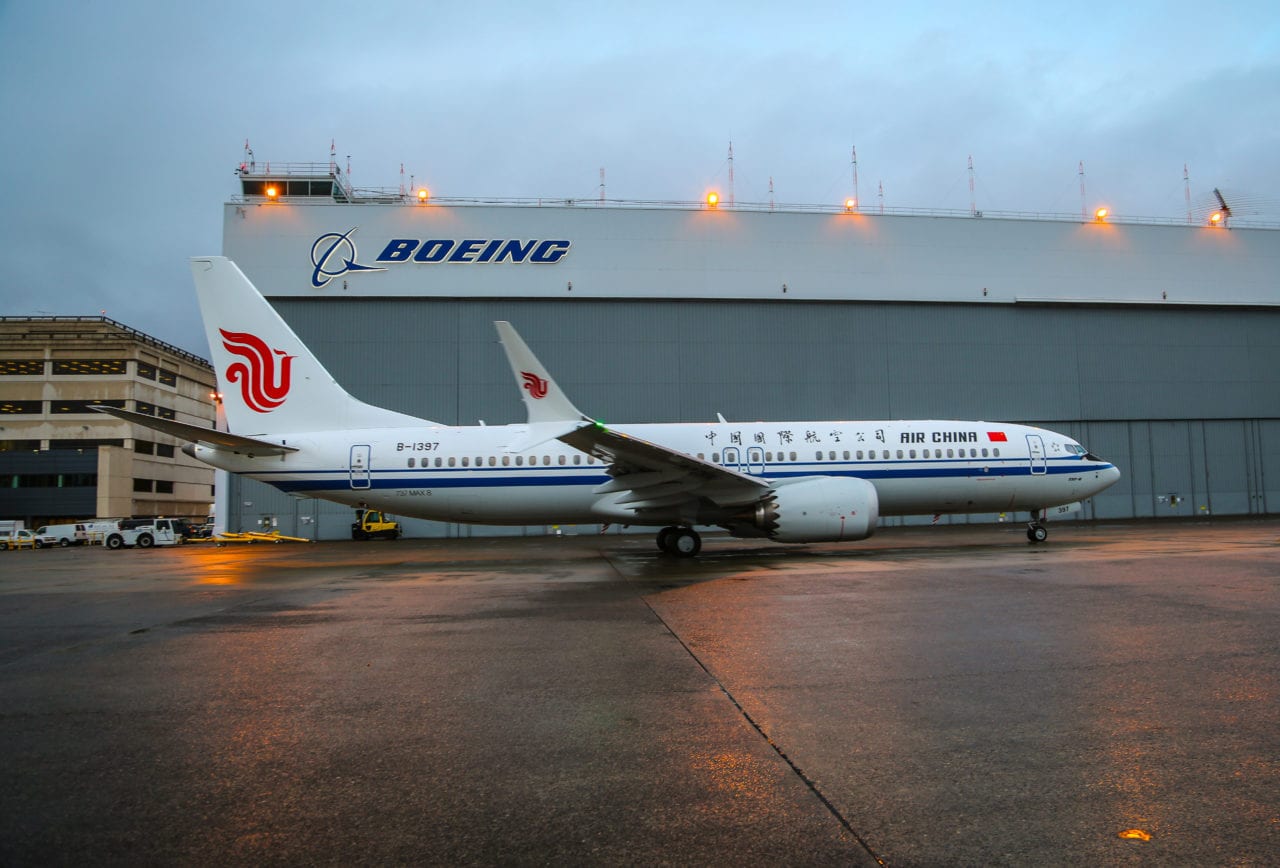
Air China took delivery of the first 737 Max 8 finished at the Chinese delivery center. (Boeing)
UPDATE, 04/29/2019: Boeing’s board of directors has approved a $2.055 per share quarterly dividend. The manufacturer paid $1 billion in dividends in Q4 2018 and $1.2 billion in dividends in the first quarter of 2019. The board has still not issued updated guidance after falling short of its previous guidance in Q1 due to the ongoing trouble with the 737 MAX, but it said that it would when it is able to more accurately predict the company’s outlook — likely once it knows when the MAX will be back in the air.
Stalling 737 sales in the wake of the MAX family’s grounding led to a 2 percent decrease in revenues for planemaker Boeing compared to last year’s first quarter. The company brought in $22.9 billion total and $2.4 billion in earnings from operations, down 18 percent year-over-year from 2018’s $2.9 billion.
“Across the company, we are focused on safety, returning the 737 MAX to service and earning and re-earning the trust and confidence of customers, regulators and the flying public,” said Boeing head Dennis Muilenburg in a statement. “As we work through this challenging time for our customers, stakeholders and the company, our attention remains on driving excellence in quality and performance and running a healthy sustained growth business built on strong, long-term fundamentals.”
Boeing’s largest segment, commercial airplanes, saw a 9 percent revenue decrease to $11.8 billion from nearly $13 billion at the same time last year. Despite improved margins on the 787, of which the company delivered 36, the 737 line dragged Boeing down in the first quarter, with its deliveries falling by a third, from 132 to 89, reflecting both carriers’ refusal to take delivery of the 737 MAX and a subsequent production cut by Boeing.
Total deliveries dropped from 184 in 2018 to 149 this year and making the 737 production rate adjustment cost the company $1 billion, Boeing CFO Greg Smith said during an April 24 conference call with reporters and analysts.

Boeing CFO Greg Smith (Boeing)
The 737 MAX is the fastest-selling plane in Boeing’s history and Muilenburg has previously said that the company planned to switch most production and sales over from legacy 737s to MAX planes this year. However, after two deadly crashes, the 737 MAX line was grounded around the world in March, and it is unknown when they will again be airborne. Boeing’s future hinges on getting its workhorse back in the sky, but its financials show some of the short-term pain the manufacturer is feeling, which is likely to extend into future quarters.
The impact of the 737 MAX on Boeing’s financials led the company to suspend its financial forecasting until it gets more clarity on when the program will be back on track. The commercial backlog remains significant at over 5,600 planes valued at $399 billion, though it is down from $408 billion at the start of the quarter.
While the commercial segment kept the company’s revenues in the red, Boeing otherwise soared.
The new global services business improved 17 percent year-over-year to $4.6 billion, despite a decreased operating margin of 14.1 percent. Boeing acquired parts distributor KLX last year and ForeFlight earlier this year to bolster its services segment, which is paying off. The company won first-quarter contracts for the U.S. Navy’s V-22 program and U.K. Royal Air Force’s P-8A training. The division also received an order for 10 converted 737-800 freighters for GE Capital Aviation Services.
Defense, space and security saw modest improvement, growing 2 percent year-over-year to $6.6 billion but with 12 percent better earnings at $857 million. According to Smith, a property sale helped prop up the earnings. Highlights for the segment include a U.S. Navy contract for 78 F/A-18 Super Hornets and orders for 19 P-8 Poseidon aircraft from multiple buyers. Boeing delivered 22 remanufactured AH-64 Apaches and six new ones, up from six and none, respectively, last year.
Total order bookings in the defense segment amounted to $12 billion in value, bringing the value of Boeing’s defense and space backlog to $67 billion. Of that, 31 percent is from international buyers.
Company-wide, Boeing spent a net $866 billion on research and development efforts in the first quarter, up 13.4 percent year-over-year. While spending in every division increased, the bulk of that difference — $76 million — was categorized as “other,” where Boeing spent a net negative $2 billion last year.
Free cash flow in the quarter was $2.3 billion and the company’s overall backlog stood at $486.9 billion, down 0.7 percent from $490.5 billion at the start of 2019.